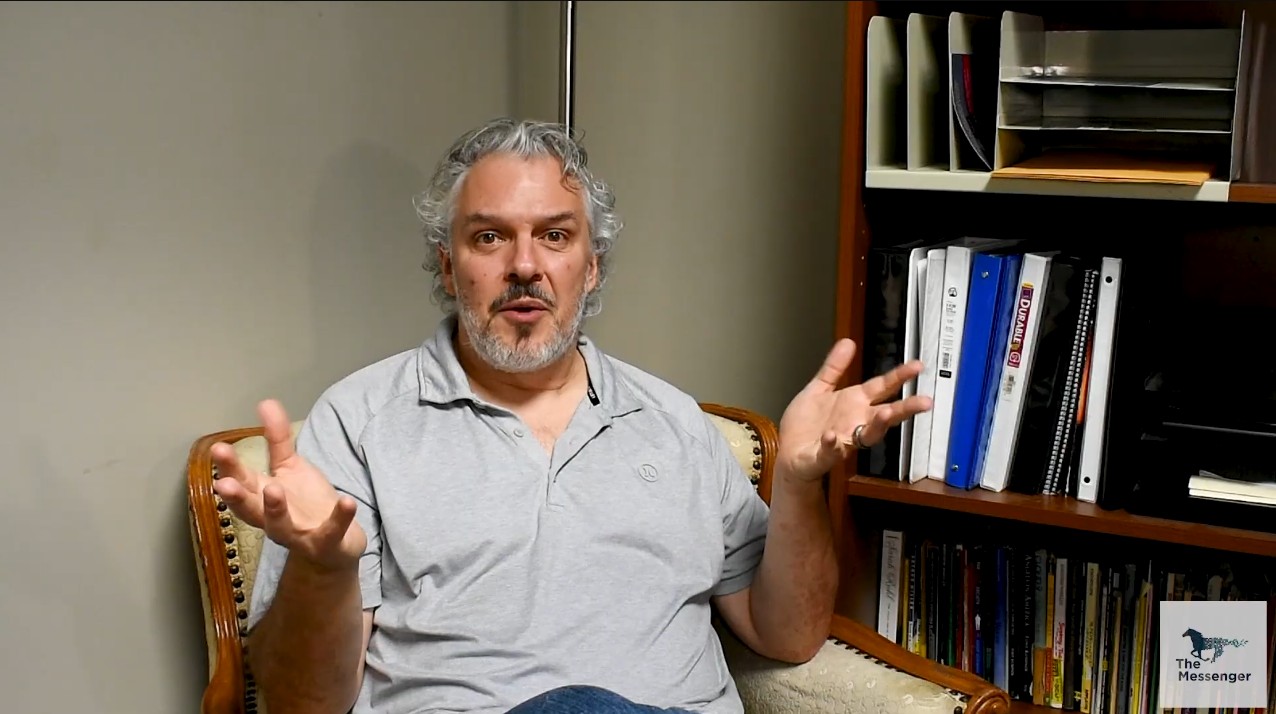(Photo by: Rafael Matsunaga/Flickr)
Editor’s Note: All Opinion articles reflect the opinion of the writer only, not The Messenger or Johnson County Community College. JCCC students interested in writing for The Messenger’s Opinion page can contact us at [email protected].
By Richelle Wagner
The Invisible Cost of Inflation
In an opinion piece titled “USAID: A Murder,” the author criticizes Elon Musk’s significant cuts to USAID funding, presenting them as a moral crisis. However, this emotional perspective misses an essential economic truth: concentrated benefits are obvious, but dispersed costs—like inflation—are a silent killer.
The immediate impacts of USAID cuts on recipients are easily visible. Yet, as economist Frederic Bastiat famously illustrated, the broader economic damage from unchecked government spending often remains unseen. Kansas Senator Roger Marshall directly addressed this, saying, “Big spending and more borrowing is only going to add to inflation,” noting Americans were “feeling the sting at the gas pump and grocery store.”
Inflation has emerged as a defining issue for American voters. Polls from the fall of 2024 clearly demonstrated that the economy was voters’ primary concern, and 65% of households reported being worse off financially due to inflation. This widespread concern translated into decisive support for President Donald Trump and Republicans, providing them a clear mandate to address inflation through spending cuts.
The dangers of unchecked inflation are severe and well-documented throughout history. Hyperinflation devastated Weimar Germany in the 1920s, Zimbabwe in the 2000s, and Venezuela more recently, completely erasing personal savings, destroying purchasing power, and causing widespread poverty and chaos. In Zimbabwe, prices doubled almost daily, leading to a currency collapse and severe economic breakdown. Venezuela experienced similar devastation, resulting in food shortages, unemployment, and massive emigration.
Why Raising Interest Rates is Not a Viable Option
The United States once faced severe inflation during the 1970s and 1980s. At its peak, inflation hit 14.8%, and only aggressive action by the Federal Reserve under Chairman Paul Volcker, raising interest rates near 20%, managed to halt inflation. Today, however, such a strategy is no longer viable.
The enormous national debt, now surpassing $36 trillion, makes raising interest rates dangerously impractical. The annual interest payments alone already approach $1 trillion and are expected to nearly double by 2035. Even moderate increases in interest rates would immediately balloon the cost of servicing this debt by trillions of dollars over the coming decade, which already consumes more of the federal budget than defense or healthcare. Unlike in the 1980s, today’s massive debt load severely constrains policymakers, removing the traditional monetary tool of interest rate hikes to combat inflation without risking fiscal disaster.
Consequences of Continuing the Current Path
If the United States continues on its path of unchecked spending and debt accumulation, the consequences will be catastrophic. Economists warn that persistent deficits funded by printing money could rapidly escalate into runaway inflation, much like the hyperinflationary scenarios experienced in other countries. This could trigger a devastating economic collapse, destroying personal wealth, crippling businesses, and creating widespread poverty.
Even if hyperinflation is avoided, continuously growing debt risks a sovereign debt crisis. As debt levels become unsustainable, investors could lose confidence in the United States’ ability to repay. This could force higher interest rates on new debt, creating a vicious cycle known as a debt spiral, where the government borrows even more just to cover interest payments. Eventually, the country could face a stark choice: default on its debts or massively devalue the currency through inflationary money printing.
A default by the United States government would not only devastate the American economy but could collapse the global economic order. The U.S. dollar currently serves as the world’s reserve currency, a position granting the United States significant economic advantages, including lower borrowing costs. Reckless fiscal policy could erode global confidence in the dollar, ultimately stripping away its reserve currency status. Such a shift would drastically weaken U.S. geopolitical and economic influence, permanently raising borrowing costs and severely restricting America’s financial and diplomatic flexibility.
Former FDIC Chair Sheila Bair warned, “Our political leadership needs to listen to these seasoned professionals and others warning of danger ahead… In the past, deficits have provided the means to respond to crisis. In the future, they may well be the cause of it.”
Cutting Spending: The Necessary Solution
Given these dire realities, significant cuts to government spending are not merely beneficial—they are absolutely necessary. The immediate discomfort and political difficulty of reducing spending pale in comparison to the catastrophic economic and social consequences of allowing inflation and debt to spiral out of control. History provides clear lessons: unchecked inflation and debt can destroy nations economically, politically, and socially.
Critics may frame spending cuts as cruel or harmful, but the true cruelty would be to continue down an unsustainable path until the economy collapses entirely. The current administration’s proactive steps to reduce unnecessary and wasteful expenditures should be applauded and supported. Difficult decisions today will prevent far greater suffering tomorrow.
A Mandate for Change
Yes, spending cuts are difficult and politically unpopular. We must make painful adjustments for the long-term greater good. Shifting toward an economy less dependent on government spending will strengthen our financial stability and protect the dollar. Inflation isn’t just inconvenient; it threatens civilization itself.
Voters recognized this in November 2024, electing Trump explicitly to combat inflation and unchecked spending. Elon Musk’s role in the administration was clear from the start. Criticisms labeling Musk as “unelected” misunderstand that he operates entirely under President Trump’s elected authority.
Reducing government spending and power is rare precisely because it defies politicians’ natural self-interest. Trump’s administration deserves praise for prioritizing long-term national health over immediate political gain, and criticism for capitulating.
We must accept these necessary sacrifices now to preserve our economy—and our civilization. Allow Musk to complete the mission voters clearly demanded: saving America from inflationary collapse.
Corruption and Mismanagement at USAID
USAID has a documented history of corruption and mismanagement, undermining its purported humanitarian mission. For instance, significant scandals have involved contractors diverting millions in USAID funds intended for humanitarian assistance directly to terrorist organizations or corrupt officials. Additionally, covert programs such as “ZunZuneo” in Cuba, disguised as humanitarian aid but actually aimed at political interference, further tarnish the agency’s credibility. These systematic issues prompted Elon Musk to label USAID a “criminal organization,” reflecting broader concerns about integrity and effectiveness.
The Hidden Cost of Foreign Aid
Flooding developing nations with cheap GMO grains and subsidized American produce has repeatedly undermined local economies and created dependency rather than prosperity. For example, U.S. food aid programs led to the near-total collapse of Haiti’s rice industry by introducing large amounts of cheap American rice. Former President Bill Clinton himself later admitted this strategy failed, noting it benefited American farmers but severely harmed Haitian agriculture, leaving the country reliant on imports and unable to sustain its economy independently.
“It may have been good for some of my farmers in Arkansas, but it has not worked,” he admitted.
Similarly, Zambian farmers rejected U.S. genetically modified maize, fearing it would destroy local crop varieties and threaten their agricultural independence. The proverb holds true: “Give a man a fish and he eats for a day; teach a man to fish and he eats for a lifetime.”
Misguided Military and Foreign Aid Policies
U.S. foreign policy has long prioritized expensive military interventions and expansive military spending, draining critical resources without guaranteeing stability or long-term strategic benefits. The U.S. military budget, approaching $916 billion annually, accounts for 40% of global military expenditure, yet has produced questionable returns. Trillions spent in prolonged wars in Iraq and Afghanistan ultimately left instability in their wake, failing to achieve sustainable outcomes while creating economic burdens at home.
Moreover, U.S. foreign aid, especially through USAID, often serves geopolitical ends rather than genuine development goals. From covert operations in Cuba to controversial interventions in Bolivia, aid programs have frequently acted as tools to maintain influence, undermine governments not aligned with American interests, and foster dependency rather than genuine self-sufficiency. Such practices harm developing nations by stifling organic economic growth and perpetuating instability.
It can be argued that USAID’s interference in Ukraine contributed to the 2014 revolution, which resulted in the democratically elected president fleeing the country. This led to the eastern region of Ukraine attempting to secede, sparking a bloody civil war that ultimately culminated in Russia’s invasion. Subsequently, the United States has allocated approximately $182.8 billion to assist Ukraine—funds that have strained the national budget.
Instead of perpetuating costly conflicts and geopolitical tensions with nations like Russia and China, America would greatly benefit from economic cooperation and strategic engagement based on human rights incentives. Encouraging mutual prosperity through trade creates positive-sum relationships, reducing incentives for conflict and fostering genuine, sustainable growth. Shifting from military confrontation to cooperative economic partnerships could stabilize international relations, enrich all parties involved, and prevent unnecessary suffering and economic stagnation in developing countries.
Agricultural Subsidies: A Case for Reform
Kansas agriculture exemplifies how modern, large-scale farming operations have evolved. With 55,734 farms covering an average of 804 acres each, Kansas farmers have become highly efficient, often operating as substantial enterprises. Despite representing only about 3.47% of the state’s workforce, these farmers wield significant influence, successfully lobbying for subsidies that resemble corporate welfare more than aid to struggling farmers. Notably, the top 10% of recipients of federal farm payments received more than 79% of total subsidies over the past 25 years. In contrast, communities like the Amish abstain from such subsidies on principle, demonstrating that agriculture can thrive without government intervention. Our farmers, equipped with advanced technology and economies of scale, are well-positioned to succeed even as government spending is curtailed.
Voluntary Charity, Not Coercive Redistribution
Jesus commanded individuals and churches to care for the hungry and sick voluntarily, never advocating coercive state redistribution. Genuine charity arises from personal generosity, not inflated government budgets. A more efficient economy would leave more money in household budgets to donate to these worthy causes. It’s not appropriate to use the coercive power of state taxation (or inflating the money supply) to do good works, which actually harms more than helps.
A Small Step For Fiscal Responsibility
The recent DOGE cuts, while significant symbolically, represent only a small fraction of the overall federal budget. Though critics may exaggerate the immediate impact, these reductions should be viewed as a critical first step in the broader effort toward fiscal responsibility. To genuinely stabilize our economy, substantially more cuts will be required across various sectors of government spending. Balancing the budget and addressing the towering national debt demands comprehensive, sustained fiscal discipline beyond these initial measures. Nevertheless, the DOGE reductions signal a necessary shift toward financial accountability and set an essential precedent for the difficult decisions ahead.
We need more politicians like Rep. Thomas Massie. He is willing to go against his party, get yelled at by Trump, and stick to his principles by voting against increasing the deficit. Most politicians worry about upsetting constituents and losing their seats. Massie is worried about doing the right thing, even if it means losing an election. As a result, he remains popular in his district and received more votes than Trump.
We should not be swayed by the vocal minority warning about the risks of fiscal responsibility. The quiet majority understands that deep budget cuts are necessary. Congress needs to finally take meaningful steps toward restoring fiscal sanity, ensuring prosperity for future generations rather than burdening them with insurmountable debt.
The accusation that fiscal responsibility lacks empathy is an emotional appeal with no basis in fact. We all want people to flourish, here and abroad, but we differ on the best policies to achieve that goal. It reminds me of Gad Saad’s concept of “suicidal empathy” or Michael Shellenberg’s “pathological altruism.” Those afflicted believe that they are good people, helping those in need, and doing the right thing, but they fail to recognize the long-term, unintended consequences. In the end, deficits and inflationary spending will cause far more harm than they prevent.












Leave a Reply